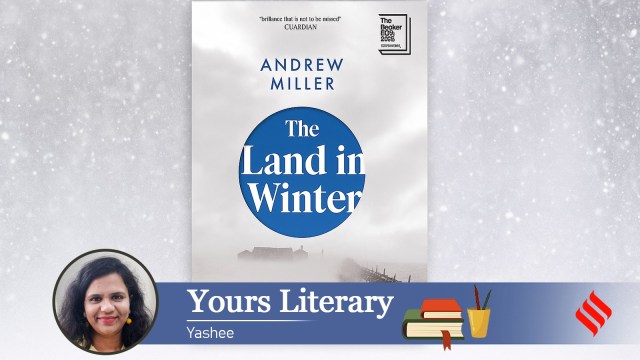This fortnight’s column is for those with frazzled and fragmented attention spans, who would like to slow down and concentrate, but find themselves overwhelmed by the constant onslaught of ‘content’ thrown at us. The book I have picked — Andrew Miller’s The Land in Winter, on the shortlist for the Booker Prize this year — demands attention and unhurried reading to savour it fully.

Here’s what the book is about, why I liked it, and what I felt could have been better.
What Andrew Miller’s The Land in Winter is about
Miller’s book is set in an English village in the ‘Big Freeze’ of 1962-63, the coldest winter the UK had seen in over a century. The book is like a still-life painting, you have to concentrate to notice the little touches of genius across the canvas.
Two young couples, very unlike, are neighbours in a village they’ve recently moved to. Both the wives are pregnant. One of the husbands is cheating. The wives, despite the class difference gulf, strike up a warm friendship. And then, it starts to snow.
As the couples find themselves cut off from the world, their past, their personalities, their preoccupations, begin to crowd in. All four, in their own ways, stare at the abyss. Will the abyss move inside them?
Outside these two households is a world where the World War and the holocaust are still casting long shadows.
Why I liked the book
Story continues below this ad
As I have outlined here, the plot is hardly novel. There is very little action. The feeling of isolation and claustrophobia is too recent a memory from the Covid-19 lockdown. But what sets it apart is Miller’s prose.
Understated, quiet, precise and evocative, it makes our brain move to its rhythm, to pay attention to the small details of the characters’ lives. The details we probably miss in our own, because our attention has been left out to hang on a screen.
Routine, every-day tasks are the building blocks of our lives: sleeping on a particular side of the bed, the coffee and eggs in the morning, the clothes lying around in a shared space, the planning and cooking of meals, the conversations over those meals. We often overlook the drama, the intent, the history, the decisions and compromises that go behind each such ‘mundane’ task, till a writer like Miller forces us to pause, notice, and process the small, revealing details.
A lot is going on in this novel where little ‘happens’.
Story continues below this ad
Irene Parry is a warm, intelligent, efficient woman, dulled and diminished by domesticity. Her husband, Dr Eric Parry, is self-centered with locker room morals, but a kind and capable doctor. Bill Simmons is trying to reject a rich, shady father by turning into a farmer. His funny, smart wife Rita Lee once worked in a club and was possibly sexually abused, and is trying to come to terms with her past and present. Irene and Bill are ‘posh’, Eric and Rita come from very different types of working class backgrounds.
Miller gives us a glimpse into every character’s mind, with few but telling details. Even the minor characters are sketched out so well you feel you’ll recognise them if you met them in the street.
Both the men moved to the countryside seeking a pastoral haven — much like we yearn after the ‘cottage core’ aesthetic on social media. But the journey towards comfort and belonging is internal, which all four learn in different ways.
What I felt could have been better
The minimalist prose left out some crucial details, I felt. The ending could have been more fleshed out. Especially for Rita, less enigma and more details would have helped.
Story continues below this ad
Ironically, I felt the novel lost momentum most when its ‘action’ picked up pace towards the end.
But that said, perhaps the lesson is that action isn’t necessarily movement. That bonds are built by paying attention, by picking up what is not said, that patience is the pleasure.
That our lives are enriched by intentional, effort-full attention; not through the endless outsourcing of our minds to an impersonal algorithm.
See you after 15 days,
Yours Literary,
Yashee
yashee.s@indianexpress.com
P.S: If you love books, write to me with what work I should discuss next. If you are not a reader of novels, follow along, and maybe you will begin to delight in the wonder and wisdom, the practical value, and the sheer joy of fiction.

































